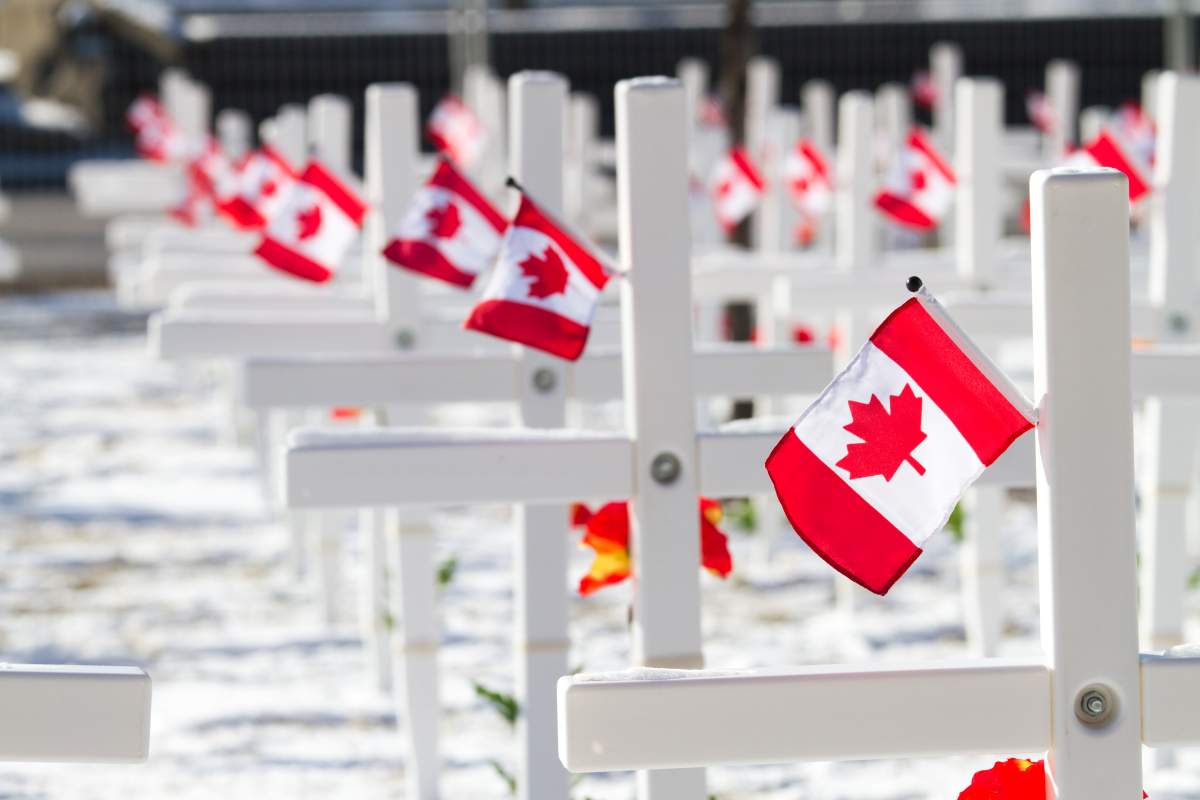The annual Remembrance Day ceremony at the Field of Crosses Memorial Project was held Thursday morning.

The event was carried live on Global Calgary, hosted by Linda Olsen and Paul Dunphy.
Usually, about 5,000 people gather for the ceremony, but for the second year in a row the event was by invitation only because of COVID-19.
The ceremony began with a blessing from Dr. Clarence Wolfleg, Field of Crosses’ Elder & spiritual advisor, followed by the national anthem sung by Cantare children’s choir.
Murray McCann, the founder of the Field of Crosses, read In Flanders Fields.
McCann said the sacrifice of our soldiers is something future generations can never forget and hopes to keep their legacy alive through the Adopt A Cross program.
“The Adopt A Cross program will fund our 11 days, plus all that leads up to the 11 days, and the breakfast we have for students, and all of the events,” he said. “It’s become quite a bit larger than just the Field of Crosses as we memorialize those who gave up their lives for this great city called Calgary and southern Alberta.”

Get breaking National news
Each November, 3,500 crosses are erected along Memorial Drive to pay tribute individually to the thousands of southern Albertans who made the ultimate sacrifice defending our freedom.
- Alberta government to review intersection where 3 junior hockey players died in crash
- ‘These boys were all of our kids’: Hockey community mourns players killed in crash
- ‘Only heavy hearts’: Tributes pour in for 3 junior hockey players killed in Alberta collision
- Danielle Smith says Alberta will withhold funding for judges without more input on selection
In addition, a separate part of the park is set aside with 120 unique crosses for a special memorial to the 120,000 heroes from across Canada who lost their lives fighting for our country.
Indigenous veterans also played a vital role in the wars throughout the 20th century.
According to Veterans Affairs, an estimated 12,000 First Nations, Metis and Inuit people served while roughly 500 lost their lives.
Indigenous Veterans Day is now held on Nov. 8 to honour those soldiers who served.
“Indigenous Veterans Day is fairly new,” said Jackie Jansen van Doorn with The Military Museums Foundation.
“With all the serving members and contributions they’ve had, we really put an emphasis on that special day.”

Despite receiving decorations for bravery, many Indigenous veterans returned home after the First and Second World Wars to find that they did not receive the same benefits as their comrades.
“Back when they did serve, they weren’t allowed to serve without relinquishing their Indian status,” said community leader and veteran Marilyn North Peigan. “That was a very discriminatory act and what we call the building of systemic racism.”
“A lot of the Indigenous veterans did lose their status when they went overseas for four years and it’s just now becoming more recognized,” Jansen van Doorn said.
Sunrise and sunset ceremonies have been held each day since Nov. 1.








Comments